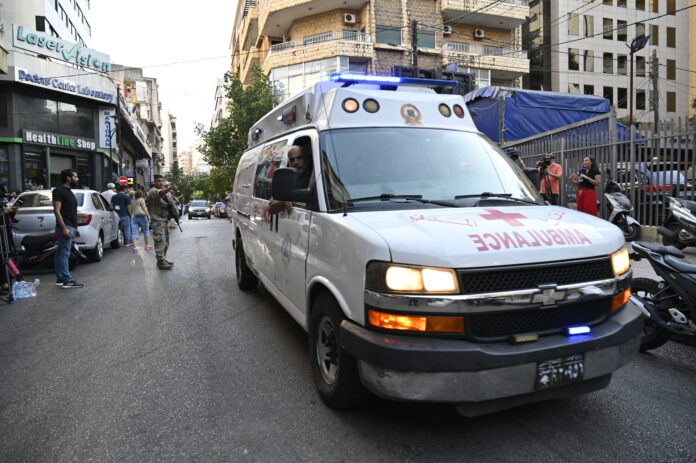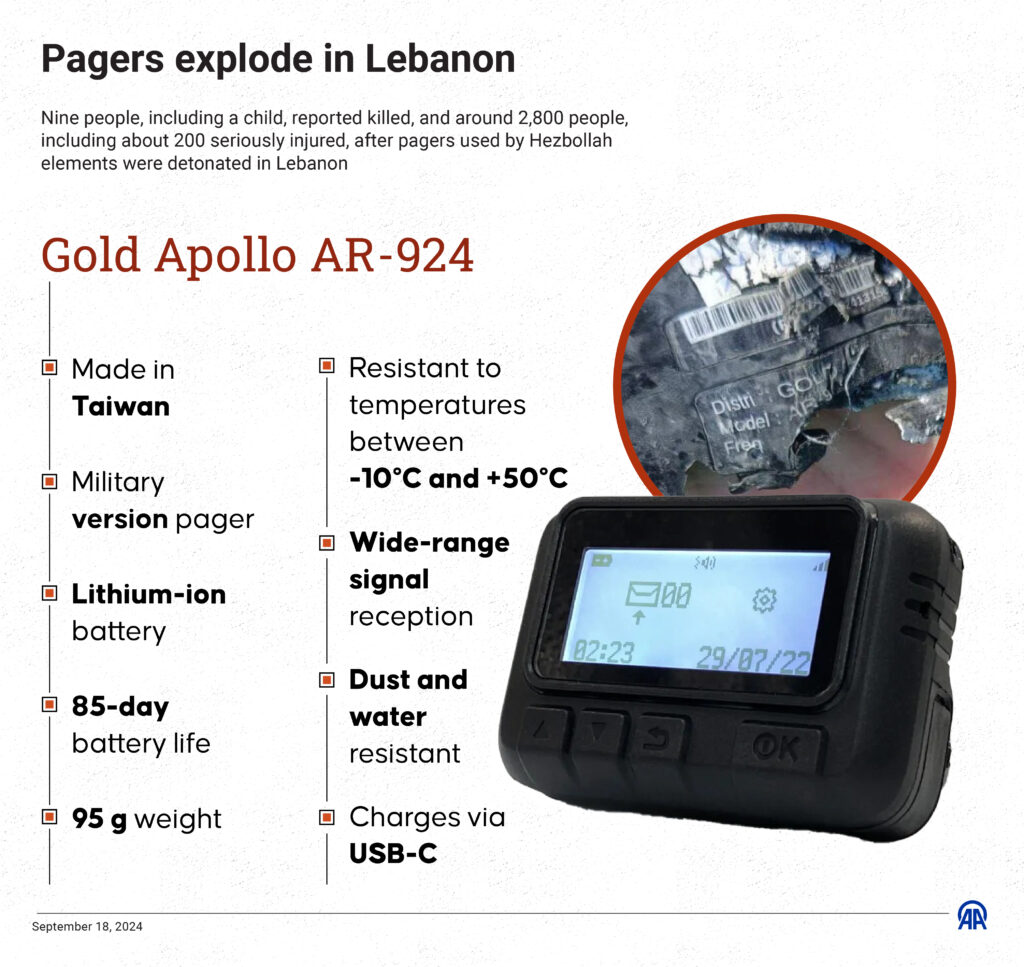
A batch of 5,000 pager devices imported by Hezbollah five months ago was “almost certain” to have been rigged with explosives before arriving in Lebanon, a former Lebanese brigadier general said on Wednesday.
The wireless devices “were rigged with several grams of hard-to-detect explosives, placed in the battery in a way that ensures they can’t be detected by sensors or any explosive detection tools,” Mounir Shehada, the government’s former coordinator with the UN peacekeeping mission UNIFIL, told Anadolu Agency.
He said the type of explosives has not yet been confirmed, with laboratories still working on that, but they are “sophisticated explosives made from modern materials that can’t be detected by sensors.”
“Lithium batteries, if they catch fire or explode, do not cause such damage,” Shehada said.
“Footage showed that there was a powerful explosion, whereas a lithium battery produces only a small flame and a very minimal explosion that wouldn’t result in such a blast.”
Regarding the location or country where the devices were rigged, suspicion has fallen on Taiwanese firm Gold Apollo but it denies making the pagers, saying it authorised the BAC company, based in Hungary, to use its brand.
“Regarding the recent media reports about the AR-924 pager, we clarify that this model is produced and sold by BAC. We only provide brand trademark authorisation and have no involvement in the design or manufacturing of this product,” Gold Apollo said.
Subscribe to our newsletter and stay updated on the latest news and updates from around the Muslim world!
At least 12 people were killed and nearly 3,000 others injured when the pagers exploded Tuesday in several areas in Lebanon, including the capital Beirut, which Lebanese media suggested was an Israeli breach of the system.
Hezbollah vows to retaliate
There was no comment from Israel on the pager blasts, but Hezbollah vowed to retaliate against Israel following the explosions.
Hezbollah Secretary-General Hassan Nasrallah is set to give an address on Thursday at 17:00 local time (1500GMT) on the explosions, how the devices were rigged and his group’s response to the blasts, Shehada said.
In a statement Hezbollah said: “The Islamic Resistance in Lebanon extends its deepest condolences and exaltations to the noble families of the martyrs who ascended yesterday, Tuesday, both in the southern front in Blida and Majdal Selem, as well as the martyrs who were killed in the treacherous and widespread aggression through the detonation of communication devices (pagers). We ask Allah the Almighty to grant the dear wounded a speedy recovery.
“The Islamic Resistance in Lebanon will continue, today as in all the past days, its blessed operations in support of Gaza, its people, and its resistance, and in defense of Lebanon, its people, and its sovereignty. This path is ongoing and separate from the severe reckoning that the criminal enemy must face for the massacre it committed on Tuesday against our people, our families, and our fighters in Lebanon. That reckoning is another matter and it is surely coming, by the will of Allah.
“What happened yesterday will only strengthen our determination and resolve to continue along the path of jihad and resistance, and we are absolutely certain of Allah’s promise to the faithful, patient fighters of victory, by the will of Allah. And victory is only from Allah, the Mighty, the Wise.”

It is also being reported that Israel launched Tuesday’s deadly pager attack earlier than planned in response to intelligence indicating that two members of the Lebanese group had become aware that their devices were compromised, according to a media report.
According to high-level regional intelligence sources, the decision to proceed with the operation early was “forced” by this intelligence lapse, said Al-Monitor online.
The intelligence sources said there had been intense discussions within the Israeli security establishment in the days leading up to the surprise attack.
They revealed that thousands of pagers, recently acquired by Hezbollah, had been rigged with explosives by Israel before being delivered to the group.
While the sources did not clarify whether Israel produced or shipped them to Hezbollah directly, they confirmed that Israeli intelligence had infiltrated them, Al-Monitor said.
“They could be controlled from Tel Aviv,” one source noted.
The Israeli military’s original plan was to explode the devices in the event of a full-blown war with Hezbollah in order to gain a strategic edge, the sources added, referring to escalating hostilities between Israel and the Lebanese group across the countries’ shared border.
“Yet suspicions from at least two Hezbollah members caused the Israeli security establishment to agree to a premature execution of the plan.”
A Hezbollah member in Lebanon was killed after expressing suspicions about foul play involving the pagers several days ago, sources said, according to Al-Monitor.
“According to the sources, days later, another Hezbollah member suspected that the devices were compromised and planned to alert his superiors, Israeli intelligence learned.”
“The sources said that Israel’s intelligence apparatus weighed three options,” said the outlet: Go to war with Hezbollah and detonate the pagers as originally planned, detonate them immediately ahead of a war and do as much damage as possible to Hezbollah personnel, or ignore the plan being compromised and risk it being discovered.
The second option was ultimately carried out in an operation that was kept confidential, even from Israel’s ally the US.
“Al-Monitor’s sources emphasised that this was not the original plan nor was it the Israeli government’s preferred course of action, opting instead to save such an operation for a full-blown conflict with Hezbollah, which boasts more than 150,000 projectiles in its arsenal, according to Western intelligence assessments.”
Online outlet Axios also reported that Israel chose to detonate the pager devices used by Hezbollah members in Lebanon and Syria due to concerns that the group might have uncovered its covert operation, according to three U.S. officials.
“It was a use it or lose it moment,” one U.S. official said, explaining the reason Israel provided to the U.S. for the timing of the attack, according to Axios.
The pager blasts came amid mounting border escalation between Israel and Hezbollah, which have been engaged in cross-border warfare since the start of Tel Aviv’s deadly war on the Gaza Strip, which has killed over 41,200 people, mostly women and children, following a Hamas attack Oct. 7 last year.
Arab and Islamic solidarity
Meanwhile, several Arab and Islamic countries have voiced solidarity with Lebanon and offered medical assistance following the pager explosions.
Turkish President Recep Tayyip Erdogan had a phone call with Lebanese Prime Minister Najib Mikati during which he expressed sorrow over casualties in the blasts.
He described Israel’s attempts to spread the conflict in the region as “dangerous,” stressing that efforts to stop Israel will continue.
Lebanese Foreign Minister Abdullah Bou Habib received a phone call from his Egyptian counterpart Badr Abdelatty, who expressed his country’s solidarity with Lebanon following the blasts.
Abdelatty said Egypt is ready to provide every possible aid to Lebanon to treat the injured from the blasts.
Bou Habib also received another phone call from Iranian Foreign Minister Abbas Araghchi, who extended his condolences and offered help to provide medical attention to those injured in the explosions.
Lebanese Health Minister Firas Al-Abiad also had a phone call with his Iranian counterpart Mohammadreza Zafarghandi, who said that Iran was ready to provide medical aid and support to the victims of the blasts.
The Iraqi Health Ministry dispatched a shipment of medical aid and crews to help in efforts to treat the injured, the Iraqi state news agency INA reported.
A medical team of physicians and paramedics from the Iranian Red Crescent also arrived in Beirut to provide relief and medical care for the wounded, according to the state news agency IRNA.
Jordan King Abdullah II also ordered the dispatch of a C-130 aircraft to deliver urgent aid to Lebanon’s health care sector in the aftermath of the explosions.




















